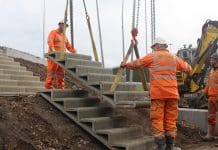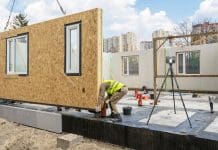There is a huge demand for high quality buildings and modular construction has been hailed as one of the most efficient offsite solutions. The industry is innovating at pace and in response to some of the evidence presented to the Environmental Audit Committee report into ‘Heatwaves: adapting to climate change’ – the offsite modular sector is keen to set the record straight regarding the claims of overheating
The Modular and Portable Building Association (MPBA) represents a broad spectrum of materials and technologies, Chief Executive Jackie Maginnis commented: “As with all sectors across offsite and traditional construction – good design gives excellent mitigation of overheating as well as enhanced winter insulation. Poor design for solar gain and a lack of natural ventilation is equally detrimental to traditional and offsite building technologies.”
The MPs put forward a raft of recommendations across all sectors including NHS guidance on summer pressures, transport, water supply and productivity, together with ensuring safe and heatwave resilient homes. The Committee heard uncertainty from Government Ministers about whether the building regulations should be used to protect human health. The Chartered Institution of Building Services Engineers believes building regulations should be changed to protect health and have developed a series of tests to prevent buildings overheating at design stage.
Jackie Maginnis continued: “The construction industry needs to have access to a full portfolio of building materials and techniques to overcome the shortfall in housing and deliver better buildings at a rapid rate.
“This report is reactionary and based on limited evidence, offsite modular construction has been implemented successfully in far warmer climates than the UK. The most important design feature for comfort is effective cross ventilation and the size and location of glazing.”
Thermal mass has a role to play in mitigating short term peaks and troughs of temperature. However, in periods of sustained high overnight temperature, as our cities have experienced recently, it is insufficient on its own to prevent overheating. Academic research has been carried out to contrast comfort levels in lightweight and traditional housing. Both perform well with good cross ventilation, but a cooler upper floor in lightweight construction is considered an advantage for occupier comfort at night. This is reinforced by the extensive use of naturally ventilated, lightweight timber homes in North America where durability and longevity are also well proven.
The offsite community is keen to demonstrate its capability, resilience and user comfort on a level playing field with traditional construction. The aim is to work in parallel and preferably partnership with traditional materials and construction methods; to provide the additional capacity and quality the sector needs.
















